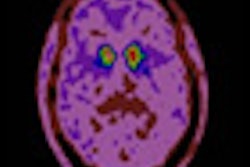A four-year study to measure the effectiveness of dopamine cell transplantation in Parkinson's disease patients indicates it produces significant improvements in motor skills and brain function, according to the January issue of the Journal of Nuclear Medicine.
With the aid of PET, the study found that transplanted cells were viable and integrated well with the host brain tissue and produced dopamine that helped support the brain and led to improved motor symptoms.
Co-author Dr. David Eidelberg, director of the Neuroscience Center at the Feinstein Institute for Medical Research in Manhasset, NY, said the study provides new insights into the time course of transplantation outcome. Comprehensive long-term clinical follow-up, together with molecular imaging, allows for a more realistic appraisal of this kind of intervention for Parkinson's disease.
The researchers reported long-term clinical and imaging outcomes after transplantation from 33 patients who originally participated in a one-year, placebo-controlled trial of embryonic dopaminergic cell implantation for Parkinson's disease.
Clinical improvement in motor ratings, as well as increased brain uptake of fluorine-18 fluorodopa (F-18 FDOPA) -- the radiotracer used to investigate the function of dopamine grafts -- was evident at one, two, and four years after the transplantation surgery.
Lead author Yilong Ma, Ph.D., associate investigator at the Feinstein Institute for Medical Research, said the research provides a valuable template for conducting imaging-based trials of cell transplantation for Parkinson's disease and perhaps other neurodegenerative disorders.
By Wayne Forrest
AuntMinnie.com staff writer
January 5, 2010
Related Reading
PET shows promise for migraines, schizophrenia, October 30, 2009
Michael J. Fox Foundation awards neuroimaging grants, February 19, 2009
Gene therapy for Parkinson's disease modulates abnormal brain networks, November 20, 2007
Gene therapy treatment offers Parkinson's relief, June 25, 2007
Stroke-related spatial neglect similar to Parkinson's, may respond to dopamine, April 19, 2007
Copyright © 2010 AuntMinnie.com



















